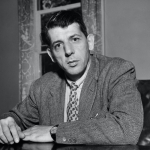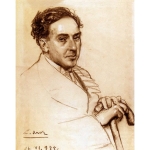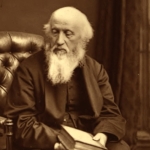—Now let me tell you why I said that.
Try to put yourself into an experimental mood.
Stop right here and try to review everything
you felt about that line. Did you accept it
as wisdom? as perception? as a gem, maybe,
for your private anthology of Telling Truths?
My point is that the line is fraudulent.
A blurb. It is also relevant that I know
at least a dozen devoutly intellectual
journals that will gladly buy any fourteen
such lines plus a tinny rhyme scheme and
compound the felony by calling that a sonnet.
—Very well, then, I am a cynic. Though, for
the record, let me add that I am a cynic with
one wife, three children, and other invest-
ments. Whoever heard of a cynic carrying a
pack for the fun of it? It won’t really do
I’m something else.
Were I to dramatize myself,
I’d say I am a theologian who keeps meeting
the devil as a master of make-up, and that
among his favorite impersonations he appears,
often as not, as the avuncular old ham who winks,
tugs his ear, and utters such gnomic garbage
as: “Nothing is really hard but to be real.”
I guess what the devil gets out of this—if he is
the fool he seems to be—is the illusion of
imitating heaven. If, on the other hand, he is no
fool, then his deceptions are carefully practiced
and we are all damned. For all of us, unless
we are carefully warned, will accept such noises
as examples of the sound an actual mind makes.
Why arc we damned then?—I am glad you asked that.
It is, as we say to flatter oafs, a good question.
(Meaning, usually, the one we were fishing for. Good.)
In any case. I may now pretend to think out the answer
I have memorized:
We are damned for accepting as
the sound a man makes, the sound of something else,
thereby losing the truth of our own sound.
How do we
learn our own sound? (Another good question. Thank you.)
—by listening to what men there have been and are
—by reading more poets than jurists (without scorning
Law)—and by reading what we read not for its
oration, but for its resemblance to that sound in which
we best hear most of what a man is. Get that sound into
your heads and you will know what tones to exclude.
—if there is enough exclusion in you to keep the
pie plates out of the cymbals, the tin horns out of
the brass section, the baling wire out of the strings,
and thereby to let the notes roll full to the ear
that has listened enough to be a listener.
As for the devil—when he has finished every imp-
ersonation, the best he will have been able to accomplish
is only that sound which is exactly not the music.


















Comment form: